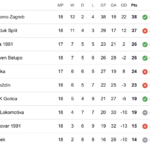
October 12, 2020 – The Croatian Civil Protection Headquarters should announce stricter measures in Croatia during a press conference at noon on Monday as the country registers a record number of coronavirus cases.
Index.hr reports that Croatia has seen a record number of new coronavirus cases for days. The highest daily number of new cases since the beginning of the epidemic happened on Thursday when there were 542 cases. There were 457 on Friday, 486 on Saturday, and 508 on Sunday.
The National Civil Protection Headquarters will hold a press conference today
On Monday at noon, the National Civil Protection Headquarters will hold a press conference.
It is expected that new, stricter measures will be presented. Judging by the statements of the leaders of the Headquarters so far, it is almost certain that the measures will not be adopted for the entire country, but locally, depending on the epidemiological situation.
The worst is in Zagreb and its surroundings
Both Zagreb and Krapina-Zagorje counties have recorded negligible daily numbers of new infections. In Krapina-Zagorje County, there were 25 cases on Friday, 16 on Saturday, and 81 on Sunday. As for Zagreb County, there were 53 on Friday, 41 on Saturday and 25 on Sunday.
As is clear from the above figures, the spread of coronavirus is the worst in Zagreb and the surrounding area. There were 126 new cases in the capital on Thursday, 161 on Friday, 199 on Saturday and 201 on Sunday, the highest daily number of new infections in Zagreb since the epidemic began.
The Zagreb Headquarters announced stricter measures all weekend
The director of the Teaching Institute for Public Health “Dr. Andrija Štampar” Zvonimir Šostar, as well as his deputy Sandra Šikić, have been announcing for days that they will ask the National Civil Protection Headquarters to introduce new, stricter measures next week.
It should be noted that the National Civil Protection Headquarters generally approves all requests from local headquarters, so it would be extremely unlikely that it would reject the requests of the leaders of the Zagreb Headquarters. Recall, this was also the case when the Split-Dalmatia County Headquarters demanded the closure of gyms and fitness centers with, to put it mildly, deficient arguments.
What measures will be introduced in Zagreb?
According to Zvonimir Sostar, several stricter measures would be introduced in Zagreb this week.
Among them, the obligation to wear protective masks in all closed, but also some open spaces, stands out.
“We will go next week with a proposal to limit the working hours of all restaurants until midnight at the most. What we will obviously have to do and what awaits us – and in Italy, it is proving to be an outstanding example, is the mandatory wearing of masks, not only indoors but also in open spaces,” Sostar said on Saturday, and he clarified that the obligation to wear masks outdoors will apply to spaces where it is impossible to ensure that the recommended distance of two meters is maintained.
Something similar was repeated by Sostar’s deputy Sandra Sikic.
“Common sense dictates that if you can’t keep your distance, put on a mask,” said Šikić and expressed her belief that wearing a mask would not be a motive for fellow citizens to avoid punishment, but infection and to protect the health of loved ones.
Sostar first asked for penalties for not wearing masks, and then changed his mind
Although Šikić says that he is against being punished for not wearing masks, her boss said two days ago that he would fine 300-400 kuna for not wearing masks.
In some European countries, not wearing masks is already fined, but neither the National Headquarters nor the local headquarters, with the exception of Sostar from the Zagreb headquarters, have so far demanded penalties for non-compliance with the obligation to wear masks.
It is interesting that Šostar changed his mind and referred to the mayor of Zagreb and the multiple USKOK indictee Milan Bandić.
“It is certain that there will be no punishment, I spoke to the mayor and he accepted that for his fellow citizens,” Šostar said in an interview with RTL on Sunday night.
“Epidemiologists are running out of energy”
“The numbers are such that we should be worried. But I believe that the number will be lower on Monday. Epidemiologists and all of us are running out of energy and I believe that we will get serious and start adhering to the measures prescribed by the National Headquarters,” Šostar added and announced that he would recommend stricter controls on youth gatherings, such as the one in front of the Croatian National Theater in the center of Zagreb.
“We will recommend that it be controlled by the police and Civil Protection,” Šostar said.
When will the new measures take effect in Zagreb?
The National Headquarters devised new measures over the weekend. There are no concrete decisions yet and it is likely that, at least as Šostar claims, they will monitor the daily number of new infections in the coming days before the final decisions are made. It is certain, therefore, that the new measures will not take effect on Monday.
“The last agreements will be made before the Headquarters on Monday. It is recommended that the working hours for all clubs, cafes and restaurants be moved to midnight. I remind the clubs that working hours are already limited until midnight by the decision of the National Headquarters,” Šostar said.
Why is the obligation of masks introduced indoors, but also in some open spaces?
On Friday, Index spoke with Minister Vili Beroš about introducing mandatory masks indoors, but also in some open spaces.
“Keeping a physical distance is extremely important to control the spread of infection. As with most respiratory infections, the only sure way to avoid infection is to avoid contact with an infected person. However, there are many situations where keeping a physical distance is not possible,” the Minister of Health said.
“In such situations, wearing a mask is not a protection for the person wearing the mask, but it reduces the possibility of spreading the indection if it is worn by an infected person. For this reason, the obligation to wear masks is already prescribed in many enclosed spaces, for example in public transport and in shops, both in Croatia and in other European countries. Indoor masks are being considered because the spread of the infection has been noticed in many workplaces among colleagues who are in close contact, for example sharing the same office, and who have not been able to keep physical distance,” Beros told Index.
Many European countries are introducing stricter measures
Many European countries have been recording record daily numbers of new infections in recent days, which is why they are introducing new, stricter measures.
In Ireland, 1,012 new cases of COVID-19 were recorded on Saturday, the largest increase in the number of new cases in one day since the start of the epidemic and almost twice the average of last week. The Irish government closed restaurants across the country last Monday and limited the number of visitors to nursing homes.
For the first time since the start of the epidemic, the number of new cases in France was higher than 26,000 on Saturday. On Sunday, measures came into force that provides for the closure of all bars and stricter health protocols in restaurants.
Slovenia currently has over 3,000 active cases of coronavirus infection, 149 patients with COVID-19 are in hospitals, of which 21 are in intensive care, and 167 people have died as a result of the infection so far. Due to the worrying epidemiological situation, the Slovenian government this week introduced a ban on gathering more than ten people in public and private spaces, and restricted work and prescribed conditions for restaurants and catering facilities.
In the Czech Republic, COVID-19 is spreading rapidly, and 8618 new cases were recorded on Saturday. They registered four consecutive days with record numbers, with an increase of about 3,300 new infections compared to the day before. As of Monday, all theaters, cinemas, museums, galleries and sports facilities will be closed for two weeks to stop the spread of the coronavirus.
Italian authorities reported 5372 new cases in the last 24 hours on Saturday The Italian government is considering introducing additional measures against the spread of coronavirus, but without returning to full lockdown. The new law would ban gatherings in front of bars and restaurants. The government is still debating the proposal, but the new rules are expected to be presented by Thursday.
For the latest travel info, bookmark our main travel info article, which is updated daily.
Read the Croatian Travel Update in your language – now available in 24 languages.
Join the Total Croatia Travel INFO Viber community.











